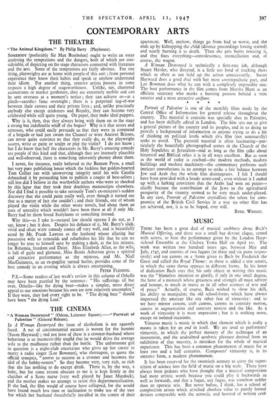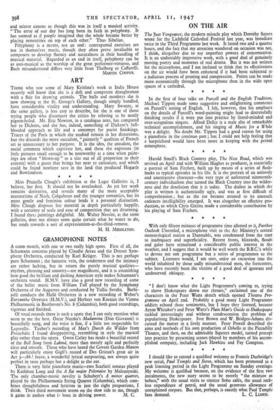MUSIC
THERE has been a great deal of musical snobbery about Bach's Musical Offering, and there was a small but devout clique, armed with scores, to hear the performance given by the London Harp- sichord Ensemble at the Chelsea Town Hall on April 1st. The work was written two hundred years ago, between May and July, 1747, and consists of two fugues (in three and six parts respec- tively) and ten canons on a -heme given to Bach by Frederick the Great and called the Royal Theme: to these is added a trio sonata, in which the same theme appeals in different forms. In his letter of dedication Bach says that his only object in writing this music was the "blameless intention to glorify, if only in one small degree, the fame of a monarch whose greatness and strength all must admire and honour, as much in music as in all other sciences of war and of peace." Actually, of course, Bach wished to show his skill, his ability to manipulate the old school-forms which have always impressed the amateur like any other feat of virtuosity : and so we. have mirror canons, crab canons, canons in contrary motion, canons in augmentation and contrary motion and the like. As a work of virtuosity it is most impressive ; but it is nothing more, except on isolated occasions.
Virtuoso music is music in which that element which is really a means is taken for an end in itself. We are used to performers' virtuosity, in which the perfect mastery of the technique of an instrument, and the undoubted aesthetic pleasure derived from an exhibition of that mastery, is mistaken for the whole of musical experience. This has been a common phenomenon of music for at least two and a half centuries. Composers' virtuosity is, in its extreme form, a modern phenomenon.
It has been reserved for the twentieth century to carry the super- stition of science into the field of music on a big scale. There have always been pedants who have thought that a musical composition had more artistic worth because you could play it backwards as well as forwards, and that a fugue, any fugue, was somehow nobler than an operatic aria. But never before, I think, has a school of comtrosition arisen which attached absolute value to purely formal devices comparable with the acrostic, and boasted of writing crab and mirror canons as though this was in itself a musical activity. "The error of our day has long been its faith in polyphony. It has seemed as if people imagined that the whole became better by placing nonentities on top of each other." Thus Sibelius. Pdlyphony is a means, not an end: contrapuntal exercises are not in themselves music, though they often prove invaruable to composers to develop fluency and naturalness in their handling of musical material. Regarded as an end in itself, polyphony can be as anti-musical as the worship of the great performer-virtuoso, and Bach misunderstood differs very little from Thalberg or Caffarelli.
MARTIN COOPER.



































 Previous page
Previous page